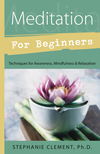Writing Meditation

During his conference in Havana, just before he obtained the Nobel Prize for Literature, Gabriel Garcia Marquez surprised me with a phrase that was short but full of truth, that I have never forgotten: "To become a writer, you have to write." Years later, when I started working on my book called Meditacion (Meditation), published by Llewellyn, I realized that what motivated me to write this book was precisely, to prove something similar to Gabriel Garcia's phrase; that is, to meditate you have to start practicing.
Of course, if we think that this statement holds all the truth we have taken the wrong step. "To learn how to meditate is easy, but preparing for meditation is not," said Swami Sivananda. Every technique that we want to learn, including meditation, requires patience and a tedious learning process. But tediousness and difficulty can become enthusiasm. That is the message of Meditation. The book communicates the notion that, without diminishing the importance of the learning process, the most important thing for the meditator should be the enthusiasm and happiness that is brought to the practice of meditation. Meditating is just like falling in love: is necessary to dedicate all of our thoughts and heart beats to it, it's also important to think that just like the feeling of love, mediation can transform people, we have to accept the idea that nothing can bring us more pleasure and benefits than the practice of meditation.
I started writing my book hoping to transmit this enthusiasm to the reader. But I did not ignore the fact that, for example, the two most prominent meditators, Buddha and Bodhidharma, could actually discourage those who started the practice of meditation! It's known that Buddha remained sitting under a tree for over six years until he reached the illumination, and Bodhidharma meditated staring straight at a wall for over nine long years, uninterrupted. In the contemporary world, it's impossible to ask somebody to do something like that with such concentration and effort. The meditator should impose neither extreme as a personal goal. Without excluding the possibility of transcending and consequently accessing higher states of consciousness, the practice of meditation can be directed to achieve immediate objectives, all earthly, such as eliminating the stress from our bodies, controlling stress, enhancing our learning and creativity skills, obtaining healing powers, awakening potential skills, improving relationships, and bringing love and prosperity into our lives.
Meditation and Health
Without any doubt, the major interest in the practice of meditation focuses on health issues. Important studies developed at Harvard, Stanford, Yale, and other renowned universities show that meditation not only reduces high blood pressure, lowers the level of cholesterol in the body, and reinforces the immune system, it also helps to eliminate other physical problems, including very aggressive illnesses such as cancer.
In the second century b.c.e., just when alchemy appeared in China, supported strongly by the Emperor, the words Yin and Yang became popular. It was the Chinese alchemists who invented the philosophy based on these two principles that rule the entire cycle of life: Yin, nocturnal, lunar, soft, and feminine; and Yang, diurnal, solar, strong, and masculine. It was precisely in those years when the Taoist Master Chuang-Tzu stated that extreme emotions damage our health. He said that if someone were excessively happy, the Yang element could be harmed, and if they was excessively angry, it could harm the Yin element.
s concept has been adopted by the medical industry. Many prominent oncologists explain that every human cell has the same balance, similar to the Yin and Yang. One gene causes an uncontrollable proliferation of cells in the body, and the suppressor gene fights back to avoid this, which is the origin of cancer. In other words, the cell tissue has its own restoration system. Through proteins, it is able to avoid irregular cell division and as a result avoid the manifestation of cancer. If cancer has already been detected in the cells, it will fight back until it destroys it effectively.
Oncologists are also pointing out that it is possible to eliminate almost every cancerous injury by simply enhancing the resistance in the body against the stress that generates modern life and, of course, by strengthening the restoration system in the body through different therapies such as relaxation and other conventional treatments, including meditation.
The book also motivates the reader by pointing out that those people who have very absorbing activities, dedicating most of its time to work, can benefit strongly by simply practicing meditation ten or fifteen minutes a day. To make it more attractive, the book includes ten practical rules for the details of meditation, from the proper position to meditate to techniques to control the respiratory rhythm.
My greatest joy, after the publication of my book, is the great response from the readers. I want to highlight a letter from Roberto Sigler, an air conditioning mechanic who lives in Miami and who wrote me to comment about a chronic respiratory obstruction that he suffered for several years and how it disappeared when he started to practice the exercises in the book. Also, from West Covina, California, Ms. Lilia Ruvalcaba says that she is very thankful for having the opportunity to read and practice meditation. What else can a writer wish?
Related Products

is subject to certain Terms and Conditions